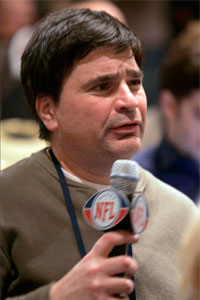Newsletter of the Milwaukee Newspaper Guild
Membership meeting
WHEN: Noon Tuesday, Nov. 15
WHERE: Turner Hall
AGENDA: Bargaining and mobilizing updates.
Lunch will be served.
Contract bargaining off to a tough start
Bargaining with Journal Sentinel Inc. has become a theatrical version of “Dr. Jekyll and Mr. Hyde.”
For most of the Milwaukee Newspaper Guild’s first few negotiating sessions, Mr. Hyde seemed to be bargaining for the company, as management’s outside attorney took a highly confrontational approach, vigorously fighting even the least controversial and least expensive Guild proposals.
On Oct. 24, Dr. Jekyll made a surprise appearance at the bargaining table, when the management attorney shifted into conciliatory mode: acting as if he was actually listening to our negotiating team’s proposals, offering somewhat constructive counterproposals and generally appearing to bargain in good faith.
But the next morning, Mr. Hyde returned, yelling, swearing and storming out of the room — all in the first 15 minutes of the session.
Later that day, Dr. Jekyll came back, at least intermittently, and we reached our first tentative agreement on a substantive contract change in the Guild’s favor.
These calculated union-busting antics contrast with previous years when we faced bargaining teams drawn entirely from newsroom management and human resources. Then, negotiations were mutually respectful and compromises were routine on the non-economic issues that typically are the focus in the early stages of the process.

This time, the temporarily conciliatory approach came just after the Guild notified members that we would run an alternative United Way campaign, and just before the well-attended “Beer and Bargaining” event on the evening of Oct. 24, when dozens of members turned out to support our negotiators and hear informal updates.
At the end of the day Oct. 25, the company agreed to our proposal to restore the fifth week of vacation, after 20 years of service, to part-timers hired in 2006 or later, the only members of our bargaining unit ineligible to reach the top vacation level. Until then, all tentative agreements so far this year had been either to keep contract language as is or to make only technical changes.
Still to come is substantive discussion on the wage proposal we presented in September.
When Guild members voted to approve a 6.6% pay cut in 2009, management told us it was intended to be temporary. Now we’re holding them to their word, even as they try to wriggle out of it.
Our proposal would bring all of our pay back to pre-cut levels, effective Jan. 1. We’re also seeking a one-time bonus to restore all of the wages lost since the cut, after subtracting the value of 2009-’10 personal days, the 2010 bonus, the partial wage restoration this year and any merit or step raises that some individuals received.
As a percentage of our pay, the signing bonus would be significantly less than the 2010 bonuses received by the Journal Sentinel publisher and Journal Communications CEO.
We’re not seeking any further pay increase for 2012. We are seeking across-the-board raises of 4.5% for 2013 and 5.5% for 2014, and increases in the minimum pay scale of the same amounts, which we view as catch-up for the years when we didn’t get any raises. We also are calling for merit pools of 2% each for 2013 and 2014.
Not surprisingly, management took a negative view of our proposal. Their own proposal calls for reducing our minimum wage scale to reflect the previous cut and partial restoration, then effectively freezing wages for most employees, giving management complete control over whether anyone ever gets any raises, based on their view of our merit. Their proposal would eliminate all language that refers to restoring our wages.
We told them that we are aware of the financial challenges facing the newspaper industry in general and the Journal Sentinel in particular. We argued that it is specifically because of those challenges that the company should be investing in its most important resource, the workers who built this newspaper into what it is today and who are its best hope for success in the future.
Our wage proposal also includes:
- Breaking the wage scale’s two- and three- year steps into one-year steps, to provide a more gradual progression of raises.
- Achieving total parity with full-time hourly minimum wage scales by 2012 for all part-time journalists, and by 2014 for all part-time support staff, and prohibiting cuts in hourly pay for full- timers who voluntarily transfer to part-time status.
- Upgrading scoretakers to the editorial assistant classification.
- Raising holiday differential from $8 now to $20 in 2012, $35 in 2013 and $50 in 2014.
Other recent proposals would allow formal Guild input on the 401(k) plan; pay overtime to anyone who works more than six consecutive days in two consecutive calendar weeks (a situation that often pops up on the copy and design desks); and close a loophole that results in some Journal Sentinel employees losing vacation in a year when they transfer from full-time to part-time status.
The next bargaining session is set for Nov. 16, the day after a Guild membership meeting.
In a related matter, our Executive Board named business writer Tom Content to the Bargaining Committee in late summer. Content, a steward leader, replaced fellow business writer Doris Hajewski, a steward who served on our local’s first board. Hajewski left in the buyout.
Health care changes
Attention Columbia St. Mary’s patients: Dec. 31 is the last day of in-network coverage, so schedule appointments before then.
Journal Sentinel Inc. rejected the Guild’s request to extend the date to the end of the plan year or to pick up new-patient charges some of us would face on our first visit to a new doctor.
The Guild has started an online forum to share suggestions for new doctors.
Questions? See Karen Samelson or Mike Johnson.
Six depart in most recent downsizing
A new round of buyouts and involuntary downsizing has eliminated six jobs in the Milwaukee Journal Sentinel newsroom, including five represented by the Milwaukee Newspaper Guild.
Journal Sentinel Inc. management has not announced the total number of positions eliminated throughout all newspaper departments, but some sources indicate it could be more than two dozen. The staff reductions were completed during late September.
The latest cuts mark a return to what had become a troubling trend. During 2009 alone, buyouts and layoffs cut the newsroom workforce by one-third. But no downsizing had touched our bargaining unit since then.
“I’m hoping we can keep our current numbers stable, but as we’ve seen, the company is willing to squeeze the newsroom any time it feels like its financial numbers aren’t up to snuff,” Guild President Tom Silverstein told members. “I remain dismayed that, with few exceptions, the newsroom cuts have been aimed at bargaining-unit employees and not management.”
The most recent staff reductions started with the August announcement that the company was offering buyouts to newsroom, production and circulation employees. Managers did not indicate the buyouts were a prelude to involuntary cuts. But when the buyouts fell short of a target that had never been announced, the buyout window was extended for newsroom employees only, with a warning that layoffs could follow.
Most of those who left the newsroom took voluntary buyouts. The Guild contract requires the company to offer buyouts to our bargaining-unit members before sending out layoff notices, and the buyout packages must be no less favorable than the contractually required severance deal of two weeks’ pay for each year of service.
By contrast, in some departments where employees are not represented by unions, the company moved directly to involuntary cuts without offering buyouts.
In contract negotiations now under way, the company is seeking to eliminate all severance pay guarantees, while the Guild is seeking to preserve the current severance level.
Members chosen for leadership positions
Mary-Liz Shaw is the Milwaukee Newspaper Guild’s new second-in-command.
At our annual meeting in September, the local’s members elected Shaw, a Journal Sentinel feature writer, as 1st vice president, in charge of contract enforcement, for a one-year term starting Oct. 1. She succeeded metro reporter Meg Kissinger, who chose not to seek a third term. Shaw was a steward and a member of our Good & Welfare Committee.
Guild members also chose metro reporter Annysa Johnson as secretary. Johnson, who had been a steward, succeeded metro reporter Erin Richards, who decided not to run for a third term.
Also joining the board as at-large members were page designer Zeina Makky and copy editor John Schumacher. Makky and Schumacher, who were stewards, succeeded PolitiFact Wisconsin reporter Tom Kertscher, who chose not to run for a fourth term, and metro reporter Amy Hetzner, our former treasurer, who left in the buyout.
Members re-elected sportswriter Tom Silverstein, to his second term as president; copy editor Karen Samelson, to her fourth full term as 2nd vice president, in charge of membership and mobilizing; deputy business editor Bob Helbig as treasurer, a job he has held for a record seven full terms and two partial terms in three stints over the past 20 years; and feature writer Jan Uebelherr as an at-large board member, for a fifth full non-consecutive term. Helbig, who is also a former president, later left in the buyout but remains a member.
In October, the new board brought another former president back into the leadership ranks, naming Greg Pearson as a steward leader.
Pearson, a Journal Sentinel copy editor who served most recently as a steward, now oversees stewards, contract enforcement, membership and mobilizing for the sports, features/entertainment and opinions staffs. He replaced metro reporter Tom Held, who left in the buyout.
The board reappointed the other two steward leaders: copy editor Russ Maki, to a fourth term serving the copy, design, graphics and national desks and the photo and JSOnline staffs, and business reporter Tom Content, to a second term serving the downtown metro and business news desks and Wisconsin news bureaus.
Other new appointments included PolitiFact Wisconsin reporter Dave Umhoefer as wage data coordinator, succeeding Helbig; metro reporter Mike Johnson as benefits coordinator, succeeding business reporter Kathleen Gallagher; Schumacher as health & safety coordinator, succeeding Umhoefer; and online producer Jenn Amur as human rights coordinator, a previously vacant position.
Reappointed were Makky as communications chair, Uebelherr as social chair, metro reporter Amy Rabideau Silvers as good & welfare chair, copy editor Jen Steele as newsletter editor, online producer Craig Nickels as webmaster, metro reporter Larry Sandler as posting and exclusions coordinator, and assistant features/entertainment editor Stan Miller as tech coordinator.
In other action at the annual meeting, members:
- Approved bylaws changes to formalize the Good & Welfare Committee as a standing committee; give the board the option of naming a human rights coordinator, instead of a Human Rights Committee; and eliminate the Organizing Committee as a standing committee, providing instead for the president to name a committee to help if an organizing drive starts.
- Renewed the rebate provision that keeps our dues at 1% of pay.
We won’t take ‘no’ for an answer

From the president
We are seven sessions into contract negotiations with Journal Sentinel Inc., and the word heard most often from the company side of the table is “no.”
No to any guaranteed severance.
No to any across-the-board raises.
No to limits on employees’ health care costs.
No to improved workplace safety measures.
No to a stronger commitment to diversity.
Were it not for the word “no,” the company wouldn’t have much to say.
By now you’ve probably read or heard that the company’s hand-picked negotiator has taken a hard-line, sometimes antagonistic approach during talks with the Guild’s negotiating team, even once storming out of the room with little more than an expletive to explain himself.
It is important to remember that this is the person our company’s top executives chose to deal with their employees, the same employees who agreed to take a 6.6% pay cut in 2009, work countless hours without hope of a raise and come to work every day with the intention of making the newspaper better.
It’s akin to siccing your dog on the mailman.
Why would you treat someone who devotes his/her job to serving your best interests in such a mean-spirited way?
At the same time, we know that the company’s executives are more than happy to accept enormous bonuses at the cost of laying off employees and keeping salaries stagnant. So maybe it isn’t a complete surprise that this is the way they have chosen to approach negotiations with such a hard-working and dedicated staff.
So what are our options for dealing with this kind of treatment?
One would be to sit back and trust that when push comes to shove, the company will recognize what a valuable asset it has in its newsroom employees and drop all its draconian proposals.
The other would be to fight back and show them that we’re united, that we deserve better than “no” and that we won’t tolerate executives treating themselves to bonuses on the backs of the employees.
The former is a pipe dream and the latter is our only hope for survival, in my opinion. As I asked in our last membership meeting, how far are you willing to go to support the cause?
We had a tremendous turnout at our “Beer and Bargaining” event last month where Guild members turned out to hear updates from the bargaining committee (as well as eat, drink and socialize). We also had positive response over running our own United Way campaign after numerous people told us they weren’t comfortable donating in the name of the company.
In November, we’ve got a lot more planned, and your participation is going to be vital. When you’re considering whether to attend one of our upcoming events, remind yourself that the company doesn’t want you to go. They would prefer you stay home and accept their terms.
Don’t do it. You can make a difference.
